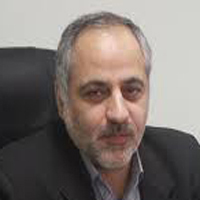The effect of solid waste compost on leaching and adsorption of heavy metals from silt-loamy soils
Author(s):
Abstract:
Background
Leaching of nutrients and heavy metals from municipal solid waste compost leads to accumulation of certain elements in soil layers, causing underground water pollution. The objective of this study was to investigate the effect of compost on leaching and adsorption of heavy metals and nutrients (sodium, potassium, and sulfate) from silt-loamy soils. Materials And Methods
In this empirical, applied study, three polyethylene columns (height 50 cm, inner diameter 10 cm), filled with sandy clay loam soil, were randomly selected. Then, 10 kg of compost per square meter were sprayed onto the columns, and leachates exiting the columns were routinely analyzed for pH, electrical conductivity, sulfate, sodium, potassium, lead, chromium, and cadmium. Data analysis was performed with Excel and SPSS software using Kruskall-Wallis test. Results
The data showed that the use of enriched and unenriched compost leachate decreased pH (from 7.43±17.0 to 6.7±0.25 and 7.07±0.11, respectively) and increased the electrical conductivity (EC) (from 1.8±0.3 mSiemens/m to 3.7±0.12 and 12.87±0.41 mSiemens/m respectively). Leakage of metals in the unenriched treatments was not significantly different from the control (p>0.78), but leakage with three metal-enriched compost applications was significant compared with control (p<0.001). Conclusion
Application of composts containing heavy metals onto loamy soils increases leaching of heavy metals from the compost into groundwater. Therefore, frequent use of compost endangers groundwater quality.Keywords:
Soil , Compost , Heavy metals
Language:
Persian
Published:
Journal of Sabzevar University of Medical Sciences, Volume:19 Issue: 3, 2012
Page:
277
https://magiran.com/p1042827
مقالات دیگری از این نویسنده (گان)
-
Determination of Bacterial Bio-aerosols Type and Its Concentration in Indoor Air of Tehran in 2023
Pezhman Gheitasian, Seyed Mohammad Tabatabaee, Anooshiravan Mohseni Band-Pay, Mohammadreza Massoudinejad, Mohsen Farhadi, Elham Shariatmadari, Mehdi Kamari, Maryam Meserghani *
Journal of Research in Environmental Health, -
Survey of Electropersulfate/H2O2 Efficiency for Treatment Synthetic Wastewater Containing Tetracycline using Response Surface Methology (RSM)
Pezhman Gheitasian, Seyed Mohammad Tabatabaee Jabali, , Mohsen Farhadi, Javad Golshani Asl, Behzad Valizadeh, Maryam Meserghani *
Journal of Research in Environmental Health,



